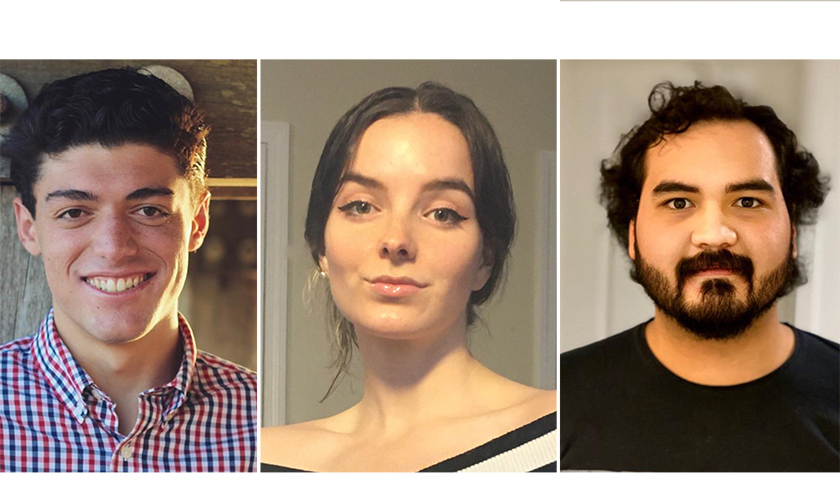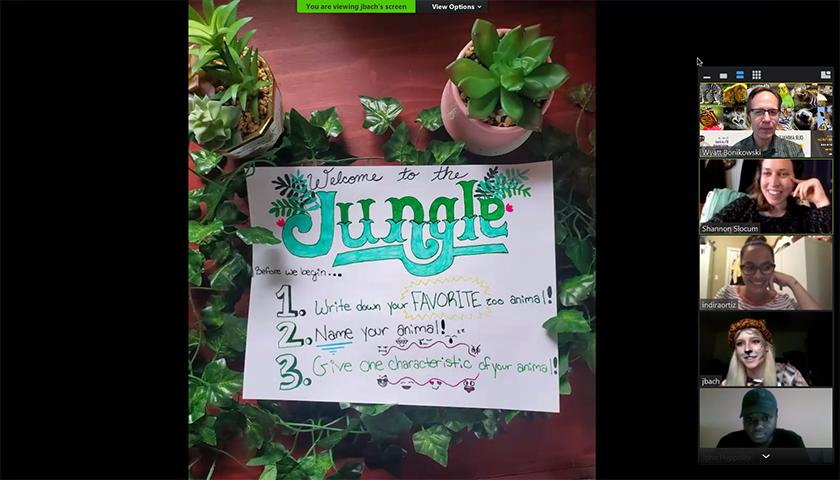Undergraduate Tutors Innovate Ways to Connect with Their Elementary-Age Pupils
Davis Altimonte records his own readings of short stories so his young writing students can listen to his voice and read along.
Julia Leone creates lesson plans that can benefit students in a Cambridge leadership program now and in the future.
Anas Sabri taught students at Umana Academy how to program a computer game, excerpts of which will be featured

“My goal is that our partners will benefit not only from the students’ volunteer hours, but that they also will receive educational resources developed by the Suffolk students that will help support their program even after those volunteer hours are over,” said Suffolk Education Professor Rebecca Taylor, who teaches the Community Tutoring Project service-learning course that spurred the students’ inventive ideas for remote tutoring.
Meanwhile, English Professor Wyatt Bonikowski’s students found a way to transform a workshop that was to bring youngsters to the Franklin Park Zoo to a Zoom session.
Adapting to change
Monday afternoons were a highlight of Altimonte’s week before the coronavirus changed everything.
That’s when he would leave campus and head to 826 Boston, a youth writing and publishing nonprofit organization, where he supported elementary school children as they tackled their homework and helped them improve their creative writing skills.
“It was such an eye-opening experience,” said Altimonte, Class of 2022, of the opportunity made possible through the Community Tutoring Project course.
Altimonte, a Sociology major, enjoyed working with the diverse student group so much that he decided to select Education Studies as a minor field of study.
His spring semester was running on all cylinders until the COVID-19 pandemic forced students to stop any in-person contact.
Yet Altimonte continues to make an impact despite not being able to see his students. He now reads and uploads short stories to the 826 Boston website where his pupils can listen to his voice as they read along with him. He posts a few follow-up questions about each story.
“I really miss the kids, but it feels good to know that I’m still helping them to succeed,” said Altimonte. “Having them hear my voice is a way I can still be there for them and they can be there for me.”
Career paths
Julia Leone, Class of 2020, took a positive, goal-oriented approach to tutoring students in the Future Leaders after-school program at the Margaret Fuller Neighborhood House in Cambridge.
“They all have different personalities, and they are all very good with technology,” said Leone. “I really liked working with them in a group setting and one-on-one.”
Leone’s lessons include direction for finding and use credible websites focused on possible career options.
She said the service-learning experience has “improved my interpersonal skills,” and she is more eager than ever to become an international high school English teacher.
Computer games
Anas Sabri, Class of 2022, has been working with the Girls Who Code program, run by the American Student Assistance organization at the Umana Academy in East Boston.
“Interacting with these students taught me about the desire for learning,” said Sabri, a Computer Science major.
Sabri taught the students how to program a question-and-answer game, which has been a big hit. He is also developing a website for the Girls Who Code and the plan is to promote snippets of the students’ game-building work on the website to recruit future participants.
“It has been very rewarding to give back to the students and the community,” said Sabri. “It has made me a stronger and more confident person.”
From zoo to Zoom
In a service learning course focused on creativity and innovation, also working with community partner 826 Boston, students had to switch gears from a workshop at the Franklin Park Zoo to a virtual session. The wild and entertaining stories that resulted from a prompt about bringing zoo animals home had lions eating all the food in the house and zebras sleeping in the bed.
Bonikowski has had students working on creative writing and literacy with 826 Boston for several years, and their final project usually is a creative writing workshop designed and run by the undergraduates during the Boston Public Schools' April vacation.
This year’s workshop was to have taken place at the Franklin Park Zoo and 826 Boston, but it was transformed into an online Zoom workshop called My Pet Zoo Animal.
The Suffolk students asked the 7-to-9-years-olds to imagine what it would be like to have their favorite zoo animals as pets in their homes and to write and illustrate stories about the fun they would have with their animals as well as the problems that might occur.
They broadcast some zoo noises and employed some visual props, and the children brought their favorite stuffed animals.
“Since we couldn't take them to the zoo, we hoped to bring the zoo home to them,” said Bonikowski. “Five of my students helped run the actual workshop, and the rest of the students pitched ideas and helped plan behind the scenes.”

Contact
Tony Ferullo
Office of Public Affairs
617-573-8448
Greg Gatlin
Office of Public Affairs
617-573-8428



